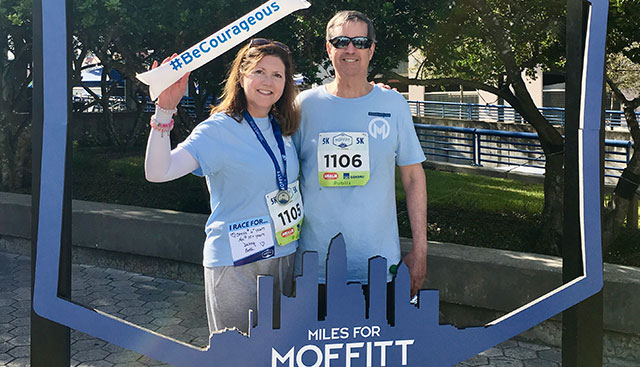
Trust in Transition: Reflections of a BMT Caregiver
By Laura Barber
Family Advisor, Patient and Family Advisory Council
My husband Steve received a life-saving stem cell transplant from a very generous, unrelated donor almost 10 years ago at Moffitt. As his full-time caregiver during those 100 critical days post-transplant – and making the transition from being an inpatient at 3 West back into our home – I understand how other caregivers might be feeling at this crucial moment: probably nervous, maybe even frightened.
As a caregiver for a Bone Marrow Transplant (BMT) patient, Moffitt has provided you with the best training and tools possible. Yet when it's just you and your loved one exiting the safe refuge of the hospital, it is definitely overwhelming. This is true whether the patient is receiving a transplant from a donor or a transplant from their own body. This is also true whether you are entering the Hope Lodge, residing in temporary housing or living close enough to return to your home. Leaving the hospital under any circumstances can feel overwhelming for caregivers.
As I wheeled Steve to the valet that crisp November afternoon, tears quietly ran down my cheeks. They were tears of gratitude for the exceptional BMT professionals and providers. Tears for all those we encountered in the clinic, treatment center and while Steve was inpatient. They were tears of anxiety, but also tears of trust. We believed in our BMT team, which included both of us. I faced this new chapter of our journey prepared, and I knew I could always reach the clinic anytime if I had any questions or doubts about something. I had to trust that the transition of the patient to me as a caregiver had been made, and I was ready.
To prepare as a caregiver – especially for a patient in a compromised state – you must find ways to build trust within your environment. Here are some tips that helped our experience:
- Review your notes, book(s) or classes when needed. A lot of information is given to a caregiver at one time. Look back on these notes to refresh your memory.
- Watch out for shoes, hands and faces.
- Shoes meet the dirtiest surfaces like floors in public spaces – keep shoes in a separate area of the house.
- Hands touch everything – wash them frequently.
- Faces – we never noticed prior to transplant how much we fingered eyeglasses, rested our heads in our hands, etc. It’s worth the effort to avoid touching your face.
- Be gentle on yourself as a caregiver – you will be very busy during this transitional time. Find any helpful shortcuts to your normal routine, like using disposable plates instead of washing dishes.
- Don't hesitate to call your medical team if you are unsure about something or if there are changes in the patient. This is a critical time and continued communication with your team is of the utmost importance.
- Finally, take a deep breath – you've got this!
Moffitt hosts weekly virtual support groups for families and caregivers of patients with any cancer type to connect with others and share mutual support. To register for the Family and Friends Support Group please call 813-745-8407 for login information.
